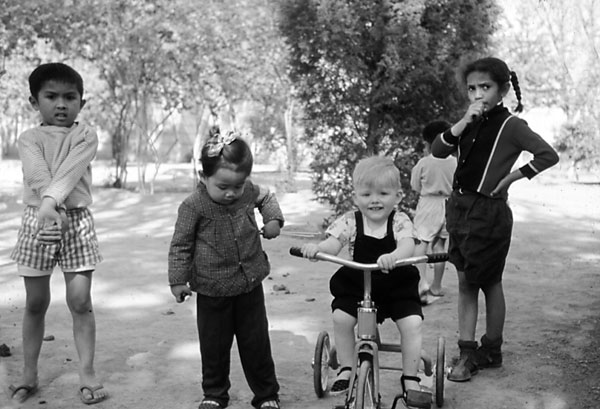Half a century of China watching
|
Colin Mackerras's son Stephen plays with Chinese friends when Mackerras family lived in China in 1966. Born in 1965, Stephan was the first Australian citizen born in China. Provided by Colin Mackerras |
When he first arrived, he was one of very few Australians in China. Fifty years later, China is his country's top trading partner and his second home. He tells Mei Jia how he has documented the progress.
Related story: China to the world mastering art of PR
Colin Mackerras has chalked up many firsts in China from the time he first set foot in the country in 1960s to his current reputation as probably one of the most influential specialists on China affairs.
One of the first Australians to follow Asian Studies with a special focus on China, Mackerras started his connection with the Middle Kingdom in the 1950s.
He first arrived in 1964, and he remembers knowing only three fellow countrymen in the country, including his wife Alice and another lady. His eldest son Stephen is the first Australian citizen born in China, and this year, the family celebrates 50 years of living and working in the country.
Many things have changed in this half a decade.
"At that time, Australians didn't like China. But now China is Australia's top trading partner," Mackerras says. He has written hundreds of academic papers and dozens of books on China, notably on ethnic studies, music and theater, and also the Western perspectives on China.
The knowledge comes from extensive travel to most parts of the country and visits to more than 60 cities.
For his efforts, Mackerras has won awards from all over the world for his contributions to cross-cultural research, and often called a "walking encyclopedia on China's transformation".
"I just have more experience and a longer time than most non-Chinese here," Mackerras lightly glosses over the honor as he sits in his sunny at Beijing's Renmin University of China where he teaches.
Born in 1939 in Sydney, Mackerras has a brother Charles, who was one of the world's leading conductors and an expert on Chopin, and a mother who believed in the rising significance of China to Australia and first persuaded him to study Chinese as a language.
"She really had foresight in the 1950s. I thank her every day for her insistence. It has completely changed my life," Mackerras says.
His mother had faith in her son's linguistic talent, and believed that since he had mastered French and German, he would do the same for Chinese. It came as no surprise to her, years later, when he would comfortably switch from "hello" to "wei?" when he answered the phone.
When he started learning the language some 60 years ago, China was regarded with fear because of the domino theory prevalent at the time.
"Now China is much more open, much more confident. It understands a lot more about other countries, and it is getting more influential," he says.

















